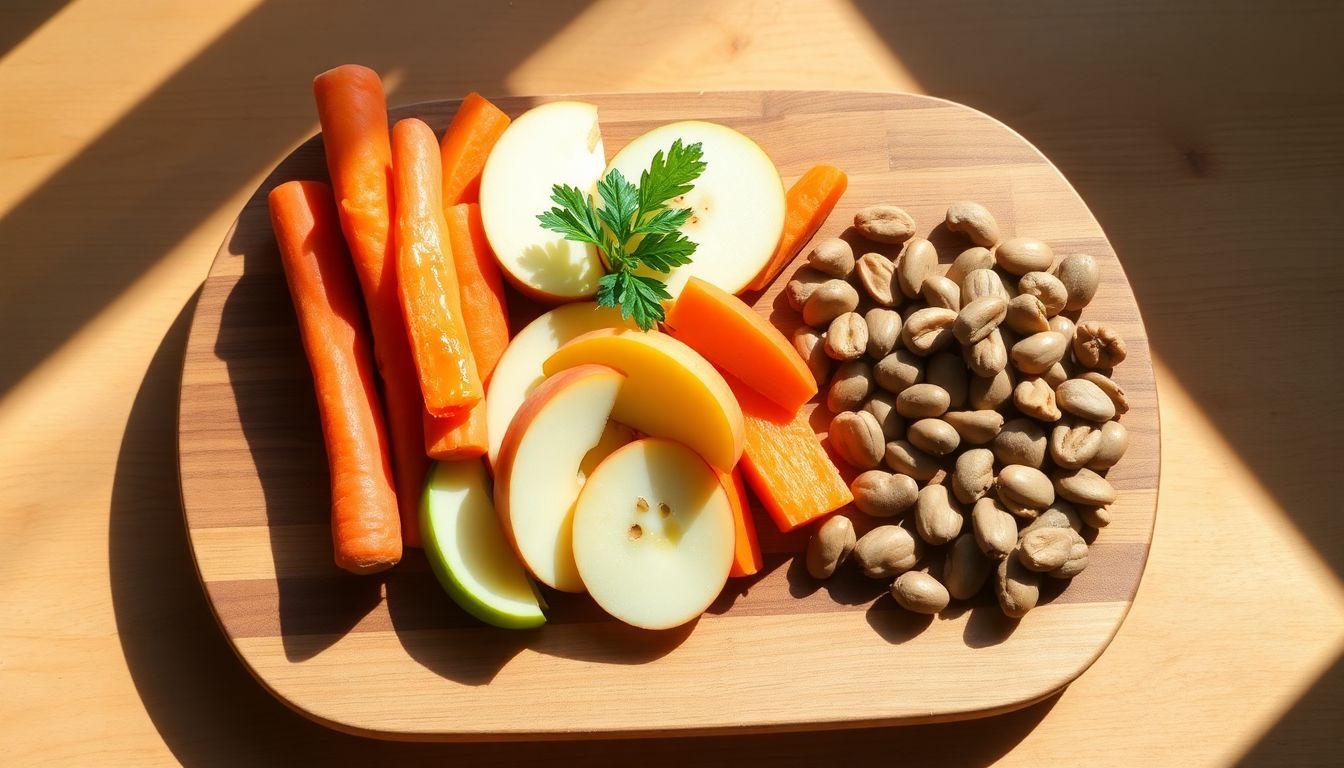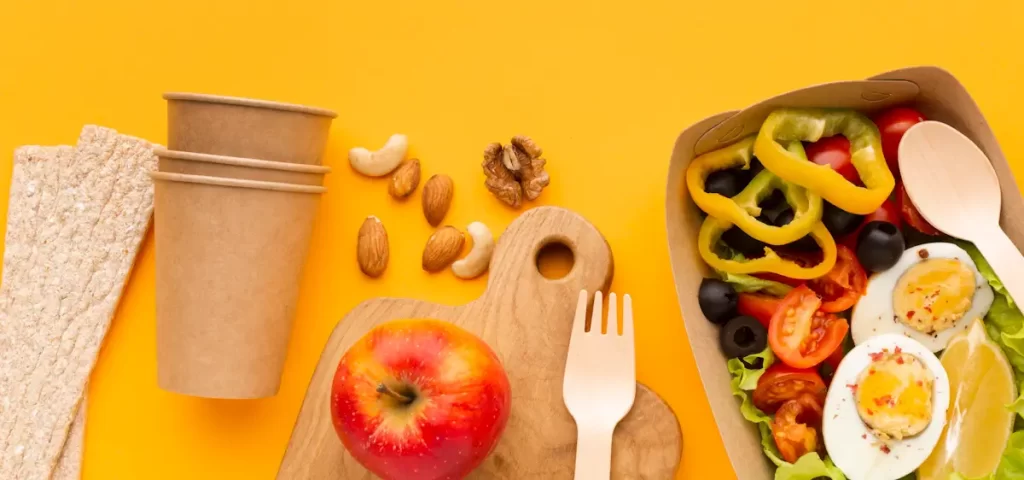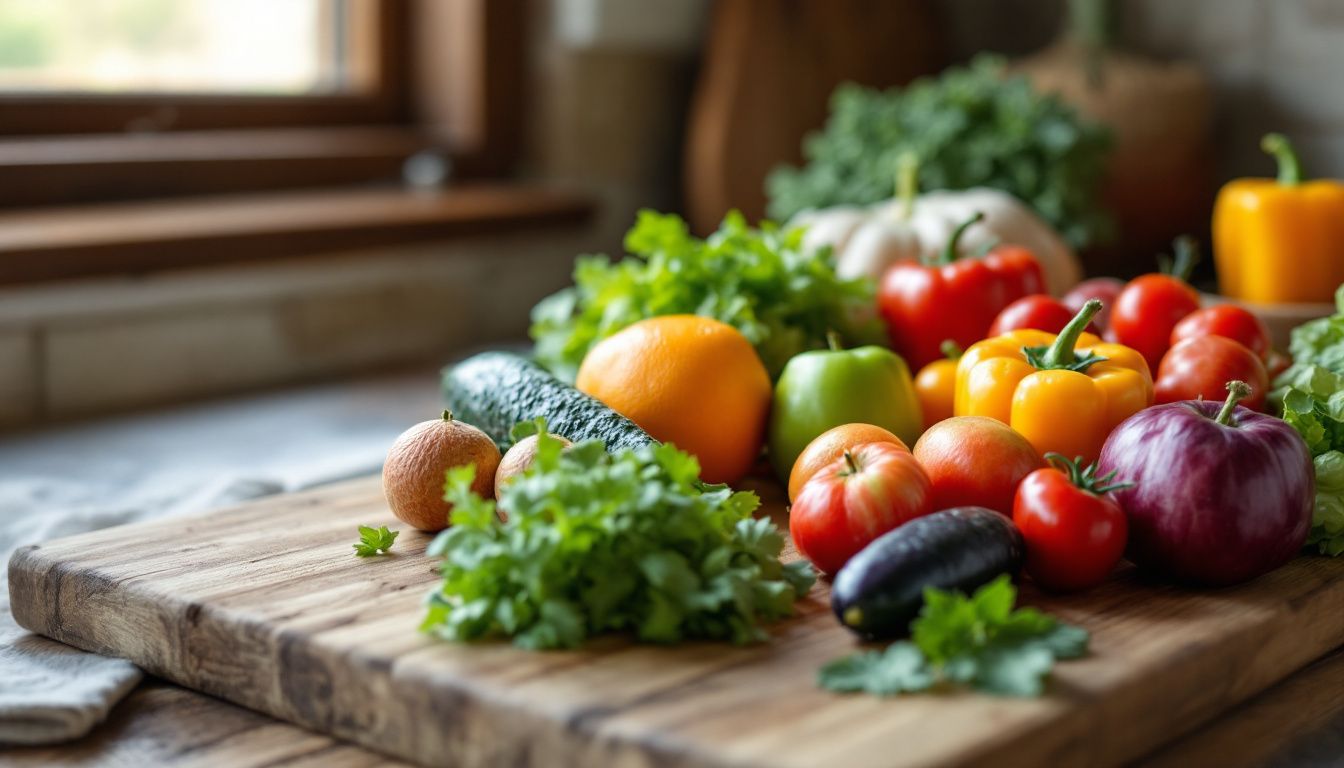Snacking can quickly derail healthy eating goals if you’re not careful. Many snack foods are high in calories but low in nutrition. This blog will share tasty and low-calorie options to keep you full and energized.
Thank you for reading this post, don't forget to subscribe!Ready for healthier snacks? Keep reading!
Key Takeaways
- Low-calorie snacks, like Greek yogurt with fruit or air-popped popcorn, can help manage hunger and prevent overeating. Aim for snacks between 150-250 calories.
- Protein-rich options, such as hard-boiled eggs or cottage cheese with berries, keep you full longer while supporting energy and weight management.
- Avoid added sugars and unhealthy fats found in processed foods. Use natural alternatives like fresh fruits or nuts for better health benefits.
- Portion control is key—small servings of nutrient-dense snacks like nuts or roasted chickpeas provide satisfaction without too many calories.
- Smart snacking improves nutrition by adding fiber, protein, vitamins (like C), and omega-3s from whole foods to your daily diet easily.
The Role of Snacks in a Balanced Diet
Snacks help keep your energy steady throughout the day. They can also stop you from eating too much at meals.
Preventing overeating
Eating healthy snacks can help curb your appetite. Snacking on low-calorie options between meals keeps you from overeating later. Choose snacks that are about 150-250 calories to stay satisfied but not overly full.
Mindful eating is key. Focus on portion control and eat slowly to enjoy every bite. For example, pair apple slices with peanut butter or grab some fresh fruit with plain Greek yogurt.
These nutrient-dense snacks also provide essential vitamins your body needs—making them both tasty and smart choices for energy throughout the day.
Healthy snacking helps balance hunger and prevents meal-time overindulgence.
Supporting energy levels throughout the day
Low-calorie snacks help keep energy steady. Foods with protein, fiber, and healthy fats are ideal. Greek yogurt with fresh fruit or celery sticks with peanut butter work well. Both provide nutrients to fuel your body without overdoing calories.
Planning ahead prevents slumps between meals. Hard-boiled eggs or air-popped popcorn can curb hunger and boost focus. Adding nutrient-dense snacks like pumpkin seeds or roasted chickpeas gives long-lasting energy while helping blood sugar regulation.
Tips for Choosing Low-Calorie Snacks
Pick snacks made with whole, natural ingredients to fuel your body. Watch how much you eat to avoid adding more calories than needed!
Focus on whole, nutrient-dense ingredients
Choose snacks made with fresh, whole foods. Fresh fruit like apple slices and banana pops offer natural sweetness and fiber. Veggie sticks—think celery sticks or bell peppers—give crunch, vitamin C, and hydration.
Foods rich in protein boost energy and keep hunger away longer. Cottage cheese paired with berries provides calcium, vitamins, and healthy fats. Roasted chickpeas deliver plant-based protein plus fiber.
Look for snacks that combine nutrients for balance—like a rice cake topped with almond butter or omega-3-rich smoked salmon on cucumber slices….
Watch portion sizes
Using smaller plates can trick your brain into feeling satisfied with less food. Apps that track food intake help monitor grams and serving sizes for healthy snacks like air-popped popcorn or nuts.
Take at least 15 minutes to eat a snack, even if it’s just some cherry tomatoes or cottage cheese. Rushing meals leads to overeating and weight gain over time. Portion control keeps you full without extra calories sneaking in!
Avoid added sugars and unhealthy fats
Choosing snacks with less sugar and fat helps your health. Added sugars can lead to weight gain, high blood sugar levels, and even diabetes. The 2020-2025 Dietary Guidelines suggest keeping added sugars under 6% of daily calories.
For a 2,000-calorie diet, that’s about 120 calories or less from sugar each day.
Replace sugary items with options like fresh fruit or plain Greek yogurt for sweetness without the risk. Unhealthy fats, such as trans fats in processed foods, harm the heart and raise bad cholesterol.
Instead, focus on healthy fats from nuts, seeds, olive oil, and avocado in small amounts. These give you energy while supporting your overall well-being without extra empty calories!

15 Healthy Low-Calorie Snack Ideas
Snacks can be both healthy and tasty with the right choices. Try simple options that combine flavor, nutrition, and satisfaction.
Fresh fruit with Greek yogurt
Fresh fruit pairs perfectly with plain Greek yogurt for a healthy snack. A half-cup of nonfat Greek yogurt has only 84 calories but packs 12 grams of protein. It also provides probiotics, prebiotics, and essential vitamins to support your gut health.
Top the yogurt with berries or sliced bananas for natural sweetness and antioxidants. Fruits add fiber, which helps keep you full longer while aiding digestion. This nutrient-dense snack is great for regulating blood sugar and weight without added sugars or unhealthy fats.
Veggie sticks with hummus
Crunchy veggie sticks with creamy hummus make a tasty, low-calorie snack. A typical serving—about 2 tablespoons of hummus paired with fresh carrots, celery sticks, or bell peppers—contains just 100 calories.
This snack is packed with fiber and protein for steady energy throughout the day.
Bell peppers and carrots offer essential vitamins like vitamin C and vitamin A. Hummus adds healthy fats from olive oil and plant-based protein from chickpeas. Together, this combination keeps you full without going over 150-200 calories per serving.
Air-popped popcorn
Air-popped popcorn is an excellent low-calorie snack. It has only 31 calories per cup, making it a light choice for munching. Six cups of microwave popcorn come to just 100 calories, with 0.5 grams of saturated fat and no cholesterol.
It’s rich in fiber, helping you feel full longer.
This snack also offers antioxidants called polyphenols, which may support overall health. Plus, it’s incredibly versatile—add a sprinkle of cinnamon or paprika for flavor without extra calories.
Enjoy it plain or experiment with your favorite spices!
Hard-boiled eggs
After enjoying a light, crunchy snack like air-popped popcorn, try hard-boiled eggs for something more filling. One large egg is low in calories but packed with high-quality protein and essential nutrients.
This makes it one of the healthiest snacks to control hunger between meals.
Pair an egg with 12 almonds for about 150-200 calories total. The protein keeps you full longer, while almonds add fiber and healthy fats. These energy-boosting snacks support satiety without spiking blood sugar levels.
Even on busy days, they’re easy to grab or pack!
Rice cakes with almond butter
Hard-boiled eggs pack protein, but rice cakes with almond butter bring crunch and smoothness together. This snack is low-calorie, vegan, dairy-free, and gluten-free—a great choice for many diets.
Spread creamy almond butter on a rice cake. Add sliced apple for natural sweetness. One serving has about 225 calories with 5 grams of fiber and protein. It’s filling yet light…perfect for healthy munchies!
Cottage cheese and berries
Cottage cheese with berries is a protein-rich snack packed with fiber and flavor. A half-cup serving typically has 80-110 calories, making it perfect for a low-calorie diet. Pairing it with strawberries, blueberries, or raspberries boosts its sweetness while adding vitamins like C and antioxidants.
For variety, try topping the mix with granola, chia seeds, or nuts. It balances sweet and savory flavors while staying nutrient-dense. This option works well to keep you full between meals without spiking blood sugar levels….
Edamame
Edamame offers a plant-based protein boost and is perfect for snacking. A half-cup serving (75 grams) has only 105 calories, yet it packs 9 grams of protein with 3 grams of fiber. This combination keeps you feeling full longer—ideal for weight management or blood sugar regulation.
It’s vegetarian-friendly and easy to prepare. Steam or microwave edamame for a quick, satisfying snack without unhealthy fats. Sprinkle them with sea salt or a dash of paprika for extra flavor! These green soybeans are nutrient-dense snacks that support energy throughout the day.
Apple slices with peanut butter
This snack mixes sweetness with creamy richness. One apple paired with one tablespoon of peanut butter offers only 150-200 calories. It’s a quick treat that takes just five minutes to prepare.
Apples provide fiber, while peanut butter delivers protein and healthy fats—keeping hunger at bay.
Boost the flavor by adding optional toppings like pumpkin seeds, dark chocolate chips, or coconut flakes. The mix of nutrients supports blood sugar regulation and provides energy without overloading on calories.
Perfect for a sweet yet satisfying snack!
Frozen banana pops
Frozen banana pops are tasty and low in calories—less than 80 per pop. You only need ripe bananas, melted semi-sweet chocolate, a bit of coconut oil, and chopped walnuts. Coat the banana pieces in chocolate, sprinkle with nuts, and freeze for 2-3 hours.
Try fun twists like adding almond butter or rolling them in crushed pistachios or coconut flakes. They’re quick to prepare too—just 10 minutes before freezing! These snacks pack natural sweetness with healthy fats and fiber.
Perfect as dessert or an afternoon pick-me-up!
Smoked salmon on cucumber slices
Smoked salmon on cucumber slices is a light, tasty snack with under 60 calories per serving. Each serving (3 bites) offers 3 grams of protein. It’s dairy-free, gluten-free, and fits paleo or Whole30 diets.
This combo is easy to make in just 10 minutes. The crispness of cucumbers pairs well with the rich flavor of smoked salmon. Packed with omega-3 fatty acids and essential vitamins, it’s perfect for weight management or healthy snacks during busy days!

Nuts and seeds in moderation
Nuts and seeds pack a punch of healthy fats, protein, and fiber. Eating 14 almonds gives you about 100 calories with only 0.63 grams of saturated fat. They are excellent for keeping hunger at bay between meals while also boosting energy.
Pumpkin and chia seeds contain essential vitamins and minerals like omega-3 fatty acids. Stick to small servings since these snacks are calorie-dense. A handful can satisfy cravings without overloading your daily calorie limit.
Pairing them with fruit or low-fat Greek yogurt adds extra nutrients to your snack time.
Mini zucchini pizzas
Mini zucchini pizzas are a low-calorie snack with just 29 calories each. They’re gluten-free, keto-friendly, and vegetarian—perfect for many diets. These quick bites take only 10 minutes to prepare.
Slice zucchini into rounds and top them with marinara sauce and shredded mozzarella cheese. Bake until the cheese melts. The result is a nutrient-dense snack loaded with flavor yet light on carbs.
Roasted chickpeas
Roasted chickpeas make a crunchy, healthy snack. Each serving has only 153 calories but packs 4 grams of protein and 4 grams of dietary fiber. They also contain 8 grams of total fat, making them filling yet light.
You can season them with spices like paprika or cumin for extra flavor.
They’re easy to prepare at home. It takes about 10 minutes to get them ready and another 45 minutes to roast in the oven. This plant-based protein option is great for weight management or blood sugar regulation while satisfying your cravings for something savory!
Low-fat string cheese
Low-fat string cheese is a quick, healthy snack with only 84 calories per stick. It offers 6.7 grams of protein, making it one of the best high-protein snacks for staying full longer without overeating.
Plus, it provides calcium to support strong bones and teeth.
This snack is portable and easy to eat anywhere—perfect for work or on the go. Pair it with whole-grain crackers or fresh fruit for extra flavor and nutrients… Next up: tomato soup with whole-grain crackers!
Tomato soup with whole-grain crackers
String cheese is a quick snack, but tomato soup with whole-grain crackers offers more comfort. A cup of this warm soup has only 74 calories and less than 0.2 grams of saturated fat.
Pair it with crunchy whole-grain crackers to stay full longer. This mix provides protein, healthy fats, and carbs for balanced energy.
Tomato soup also contains vitamins like A and C, which boost your health. Whole-grain crackers add fiber to help digestion and keep cravings away. This combo is great for weight management without feeling deprived or hungry later in the day!
Benefits of Low-Calorie Snacks
Low-calorie snacks help control hunger, improve energy, and support better food choices throughout the day—read on to discover why they’re a smart pick!
Weight management
Eating healthy snacks can help with weight management. High-protein snacks, like hard-boiled eggs or cottage cheese, keep you full longer. Fiber-rich snacks, such as air-popped popcorn or roasted chickpeas, also curb hunger without adding too many calories.
Portion control plays a big role in staying on track. Stick to small servings of nuts, seeds, or apple slices with peanut butter for satisfying but balanced energy-boosting snacks.
Choosing nutrient-dense options ensures better control over calorie intake while supporting overall health goals.
Improved nutrient intake
Low-calorie snacks like fresh fruit, cottage cheese, and roasted chickpeas pack nutrients without extra calories. Snacks high in fiber and protein promote fullness and support overall health.
Vitamin C in cherry tomatoes or bell peppers boosts immunity. Omega-3 fatty acids from nuts improve brain function.
Choosing whole foods helps meet daily value needs for vitamins and minerals. A snack like apple slices with almond butter provides fiber, healthy fats, and energy. Low-fat string cheese or Greek yogurt offers bone calcium while keeping calories low.
Smart snacking improves nutrient balance easily!
Increased satisfaction between meals
Snacks with protein and fiber can help you feel full longer. For example, pairing apple slices with peanut butter or enjoying cottage cheese and berries offers both nutrition and satisfaction.
These snacks provide a mix of nutrients to curb hunger without adding too many calories.
Greek yogurt topped with fresh fruit balances sweetness and health benefits, keeping cravings in check. Snacks like roasted chickpeas or air-popped popcorn offer crunch while supporting weight management goals.
Choosing nutrient-dense snacks helps control appetite between meals without relying on unhealthy foods.
Low-Carb, High-Protein Diets: Are They Right for You?
Low-carb, high-protein diets can help with weight loss. Eating less than 26% of daily calories from carbs may improve body composition and blood sugar regulation. High-protein snacks like hard-boiled eggs, Greek yogurt, or cottage cheese offer energy while keeping you full longer.
This diet isn’t for everyone. People with kidney problems should avoid it due to the strain on kidneys from extra protein. It might also increase heart disease risk if paired with too much saturated fat.
Balance is key—include healthy fats like olive oil and omega-3s in your meals.
Conclusion
Healthy snacking can be simple and enjoyable. Focus on snacks that are low in calories but high in flavor and nutrients. They keep you full, boost energy, and help with weight goals.
Choose options like fruits, veggies, or protein-rich foods for balance. Smart choices make all the difference!
